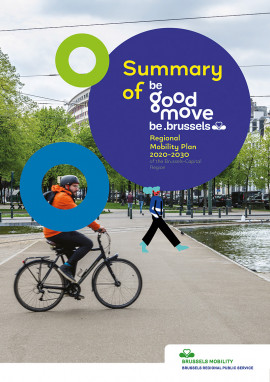The Regional Mobility Plan 2020-2030
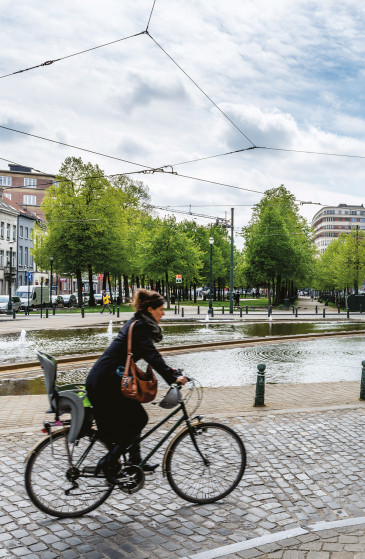
Good Move is the Regional Mobility Plan for the Brussels-Capital Region. Approved in 2020 by the Brussels Government, it defines the main policy guidelines in the field of mobility. This plan aims to improve the living environment of the people of Brussels, while supporting the demographic and economic development of the Brussels-Capital Region. It is the result of a vast participatory process involving all Brussels stakeholders: mobility and institutional partners, the municipalities, the economic and associative world as well as citizens. This participatory process took place over a period of four years.
The Good Move plan succeeds the regional mobility plans Iris I (1998) and Iris II (2010), which did not produce the change one hoped for, they did lay the groundwork for a culture of sustainable mobility. Significant advances have been made, which should be built upon even if they still don’t quite suffice. The Good Move plan places the user at the heart of all and any ideas and thoughts on daily travel. It is a part of the major environmental, social and economic challenges facing the Region (see the City Vision chapter of the plan).
The Good Move plan adopts a transversal approach to mobility - a benefit of the co-construction process - and aims to improve the standard of living of the inhabitants of the Region and to encourage everyone to change their travelling habits based on their needs and constraints. (see the Mobility Vision chapter of the plan).
The plan resolutely opts for a pleasant and safe city, comprised of peaceful neighbourhoods, connected by intermodal structural corridors and focused on efficient public transport and improved traffic flow. The plan's measures are designed to provide each user with adapted, facilitated and integrated mobility solutions, enabling them to choose the most appropriate mode of travel for each of their trips, depending on their destination and needs at a given time.
The Good Move plan proposes a new way of getting around and living in Brussels. In order to achieve its objectives, the Region has adopted a regulatory framework and an ambitious action plan. This is divided into six transversal focuses :
- Good Neighbourhood: to manage mobility in the neighbourhoods and improve the quality of life of the inhabitants;
- Good Network: organise the transportation networks and ensure an efficient service;
- Good Service: to provide the Region's inhabitants and users with a range of integrated services;
- Good Choice: to guide individual and collective choices without compromising individual freedom;
- Good Partner: ensure partnership governance of the mobility plan;
- Good Knowledge: update mobility data and regularly evaluate the Good Move plan.

In order to accomplish its goals, the Region is also focusing on the plan's application, at a regional level through the management contracts of public bodies under its supervision, and through the themed roadmaps and at the municipal level through the Municipal Mobility Plans.
To facilitate the implementation of the Regional Mobility Plan, the Government has created and approved the maps for the multimodal specialisation of roads. These are used to specify the location of the plan's mobility networks and are produced in consultation with the municipalities.
Download the Good Move plan (French or Dutch) and its summary (English)
Good Move - Gewestelijk Mobiliteitsplan 2020-2030(PDF) (27.39 MB)
Good Move - Plan régional de mobilité 2020-2030(PDF) (26.57 MB)
City Vision
The Good Move plan's City Vision has identified the major challenges that the Brussels Capital Region must face to guarantee a quality city in order to guide public action. Indeed, the regional mobility policy must meet the urban challenges of a growing metropolis, the local needs of residents and the ambitions of the Regional Sustainable Development Plan (PRDD).
Good Move identifies seven major challenges to be reconciled in a strategic vision of mobility:
:
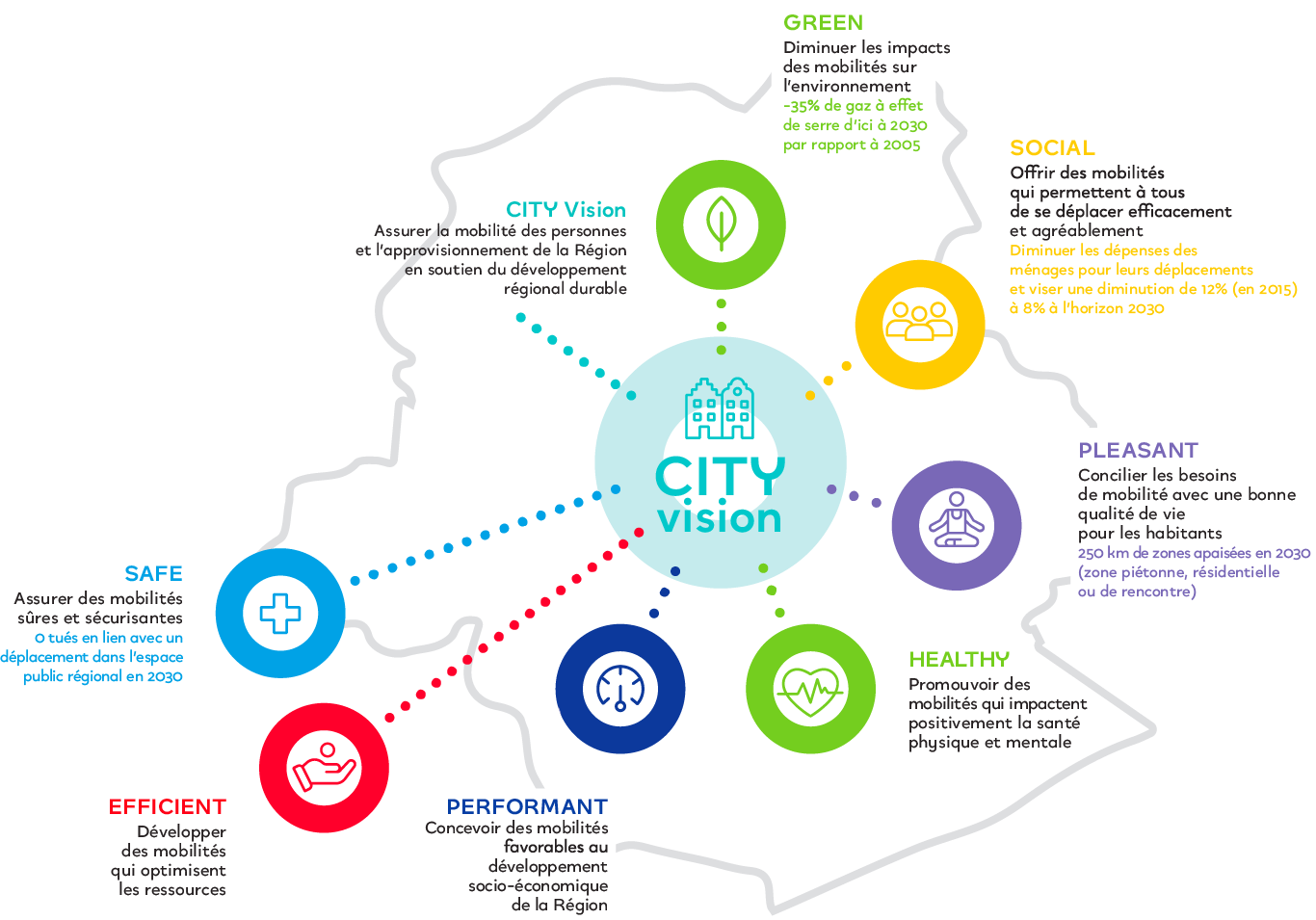
Mobility Vision
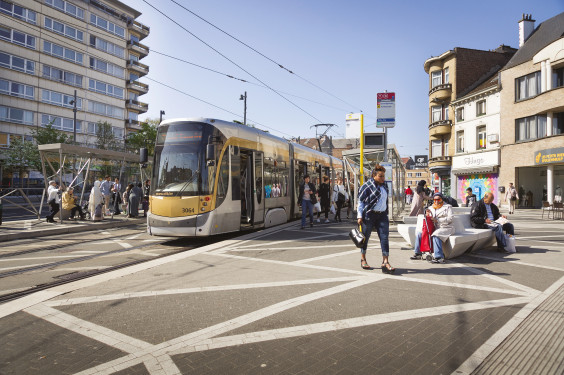
The mobility policy developed in the Mobility Vision addresses the challenge of the city's sustainable development. It proposes a cross-disciplinary vision that provides a coherent response to the issues raised in the City Vision and reconciles the environmental, social, economic and budgetary challenges, as well as those of safety, health and quality of life.
In order to address these critical issues, the Mobility Vision sets out six ambitions to improve accessibility while maintaining its attractiveness for residents, visitors and businesses:
- Influence the general demand for travel by a dense urban development and a better distribution of trips during the day;
- Reduce the need for a personal car by offering a set of attractive possibilities that meet the different needs of travel;
- Improve service mobility, through an offer that is clear and accessible to all, for all mobility services (car-sharing, taxi service, car-pooling, etc.), notably through the development of MaaS (Mobility as a Service);
- Guarantee structured and efficient transport networks, which ensure everyone’s place in public space;
- Support urban distribution initiatives by organising vehicle movements and assisting delivery people;
- Grant the parking policy and regional vision of mobility: by giving priority to off-street parking, by modulating pricing according to the different sectors, by reducing the number of places in public spaces, by encouraging the use of hybrid vehicles, active modes and new mobility solutions, etc.
A prestigious European award for the Brussels-Capital Region's Good Move plan

With its Regional Mobility Plan ̶ Good Move 2020-2030, the Brussels-Capital Region has just won the Safe Walking and Cycling award from the European Commission as part of the Award for Sustainable Urban Mobility Planning (SUMP). The European Commission's Award for Sustainable Urban Mobility Planning (SUMP) aims to encourage the adoption of sustainable urban mobility plans by local and regional authorities across Europe and reward outstanding achievements by cities in each year's thematic priority area.
The Brussels-Capital Region won the award due to the clear and ambitious objectives of its mobility plan: a speed limit of 30 km/h by 2021, "Vision Zero deaths" from road traffic by 2030 and a suitable infrastructure to make walking and cycling in the city pleasant and safe.
International recognition
The Brussels Region is one of the four winners of the 2019 European Mobility Week campaign with its Good Move 2020-2030 plan and has been recognised for its urban initiatives in terms of safe walking and cycling.
By presenting the SUMP award under the Safe Walking and Cycling theme to the Good Move plan, the European Commission has applauded the ambition of the Brussels-Capital Region in terms of mobility through the objectives set by the plan and its vision of the city as an "ecosystem", reflecting Brussels' desire to evolve sustainably and offer a better quality of life to its inhabitants and visitors. The involvement of a large number of Brussels and Belgian partners from the public, private and associative sectors in creating of the Good Move plan, as well as the significant mobilisation of citizens, including during the public survey on the draft plan (summer 2019), were also welcomed.
This international recognition is therefore an acknowledgement of the change that has been taking place in Brussels over the last few years towards sustainable mobility and a better quality of life for all Brussels residents and visitors.
Building the participatory project
Mobility is a crucial issue for the Brussels-Capital Region. With Good Move, the Government launched a participatory process in October 2016 to develop its new regional mobility plan. It is a dynamic approach involved most Brussels and Belgian stakeholders - both public and private or associations ̶ as well as citizens, with the aim of working together to find innovative solutions to the problem of travel.
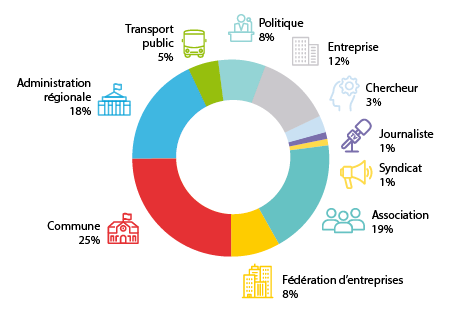
Before its final approval, the plan went through several development stages including a diagnosis of the initial situation, explained in the diagnosis sheets, (+reference), sharing experiences from other cities, the creation of a citizens' panel in the Brussels Parliament (link to the resolution), the organisation of numerous discussion forums (...), the approval at first reading by the Government of a first draft and finally, the organisation of a public survey, which was a great success. After four years of consultation, this process culminated in the Good Move plan approved by the Brussels Government for the 2020-2030 period.
Training
Mobility advisors
To allow Brussels regional and municipal stakeholders to rely on a common culture of mobility, since 2001, Brussels Mobility has organised "Mobility Advisor" (CeMa) training. To date, Brussels Mobility has trained just under 400 mobility specialists!
The administration has also launched a platform enabling these mobility specialists to share their experiences and improve their knowledge. This is also an opportunity to strengthen collaboration with existing networks in Wallonia and Flanders.
What is a mobility advisor?
Mobility advisers carry out essential functions within their institution (administration, company, association, political cabinet, etc.):
- They act as the liaison between the multiple stakeholders involved in the problem of travel;
- They monitor mobility projects from their conceptualisation to their realisation and development in the field;
- They identify failings in terms of travel and propose solutions;
- They simplify communication to the general public.
A network of mobility advisors, why?
Brussels Mobility, in partnership with Brulocalis (Association of the City and Municipalities of the Brussels-Capital Region), proposes structuring the mobility advisors in a network in order to:
- Strengthen links between mobility professionals,
- Encourage the pooling and sharing of knowledge and skills,
- Provide ongoing training,
- Offer different services around the basic training courses, such as training and working groups on additional regulations, heavy goods vehicles, trade and mobility.
Tools provided for mobility advisors:
- The Moniteur de la Mobilité: Brussels' mobility magazine, published three times a year;
- The Cahier du moniteur de la mobilité which provides clarification on certain topics (construction site management, school travel plans, parking, etc.);
- Training courses in addition to the basic courses based on current events and special requests from the mobility advisors;
- Working groups covering topics in a more detail in small groups;
- An annual meeting is held to take stock of the network's activities and provide guidance for the following year's programme.
Interested in mobility advisor training?
The training is designed for professionals working in the field of mobility (Brussels regional and municipal officials, STIB, police, cycling associations, etc.). If you are part of the target audience, please contact Brussels Mobility: mobilite@sprb.brussels

